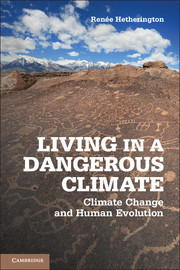Book contents
- Frontmatter
- Contents
- Figures
- Tables
- Foreword: Evolution and the Human Condition
- Acknowledgments
- Preface
- Earth’s Climate
- The Evolution of the Homo Species
- Climate and Human Migration
- Climate and Agriculture
- The Dominant Paradigm
- Today and Tomorrow
- The Economic Connection
- 18 The Economic Connection
- 19 The Progress of Dominance
- Dangerous Attitudes
- Living in Dangerous Times
- Glossary
- Notes
- Index
19 - The Progress of Dominance
Published online by Cambridge University Press: 05 June 2012
- Frontmatter
- Contents
- Figures
- Tables
- Foreword: Evolution and the Human Condition
- Acknowledgments
- Preface
- Earth’s Climate
- The Evolution of the Homo Species
- Climate and Human Migration
- Climate and Agriculture
- The Dominant Paradigm
- Today and Tomorrow
- The Economic Connection
- 18 The Economic Connection
- 19 The Progress of Dominance
- Dangerous Attitudes
- Living in Dangerous Times
- Glossary
- Notes
- Index
Summary
None of the classical economists believed that mathematics should be the model for social science. For Adam Smith and Adam Ferguson, economics was grounded in history. It was bound up inextricably with the rise and decline of nations and the struggle for power between different social groups.
John Gray, Al Qaeda and What It Means to Be ModernThe most successful economies are those that have the flexibility and dynamism to cope with and embrace change.
Sir Nicholas Stern, Stern Review: The Economics of Climate ChangeOver the past several millennia, dominant human societies have flowered and declined, including the complex, advanced Maya culture; the Roman Empire, with its huge influence on the modern world; and the British Empire, with its vast conquered territories and global political power. When a society is successful, its citizens come to believe that their way of managing people, politics, communities, religion, culture, education, and economics is the right or best way, and sometimes the only way. Prolonged success can reduce the society’s capacity to adjust to impending change.
Darwin’s theory of natural selection and survival of the fittest serves to reaffirm this attitude. The dominant entity, whether it is a society, culture, or business, is by definition the fittest. This naturally leads to the conclusion that its laws, morals, principles, business practices, religion, language, and culture are best and that all actions, behaviors, or attitudes that ensure success are, by definition, justified and fitting.
- Type
- Chapter
- Information
- Living in a Dangerous ClimateClimate Change and Human Evolution, pp. 168 - 172Publisher: Cambridge University PressPrint publication year: 2012



